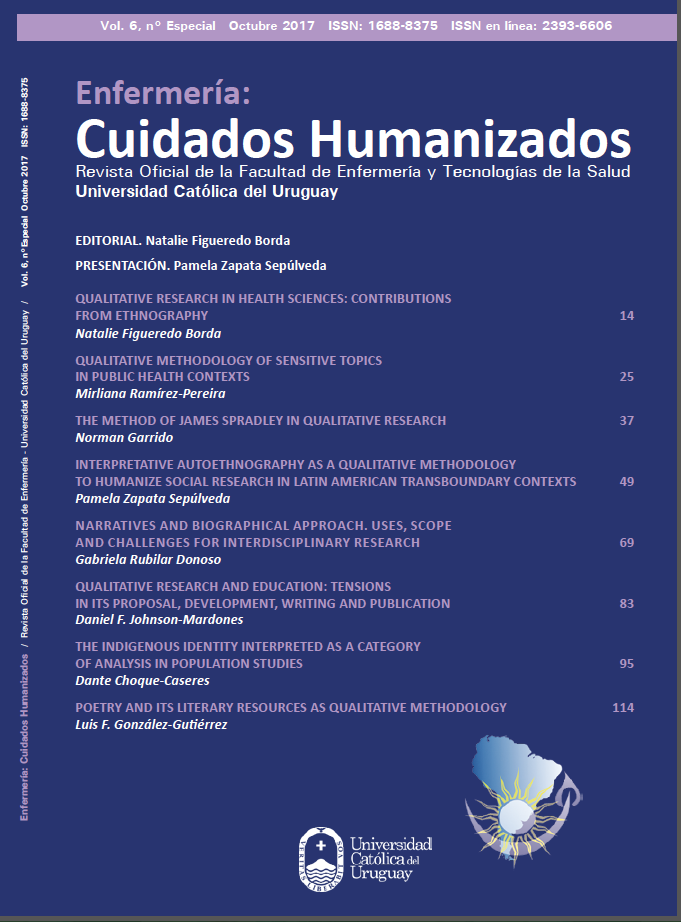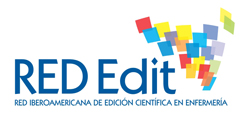THE METHOD OF JAMES SPRADLEY IN QUALITATIVE RESEARCH
DOI:
https://doi.org/10.22235/ech.v6iEspecial.1449Keywords:
Interviews as Topic, Methodology, Qualitative Research, SemanticsAbstract
This paper shows the Developmental Research Sequence Method developed by James Spradley. This procedure is among one of the most important global approaches in qualitative research. The strategy of Spradley was designed in a didactic way to guide the work of junior researchers whose main technique for the collection of data is the ethnographic interview. The fieldwork turns the observer into a research tool. Thus, there are necessary procedural recommendations for the proper study of the people in their life settings such as workplaces, neighborhoods, hospitals and schools, among others, spaces where individuals develop their daily lives. The basic orientations for the observation and the processing of the information are shown in a sequence of steps. The data comes from the study of phenomena, related to various branches of the social and health sciences, where people are studied in their life context The steps in this method create frameworks that guide the way to perform the analysis of the information. Hence, the researcher receives suggestions that place him constantly between the analysis of data and the collection of information in the field work. The use of this type of recursive technique allows him to adapt the observation, based on the questions and objectives of the study that has been carried out. It is of great help for obtaining data to guide the research towards connected results in the process of knowing, describing and getting recommendations to intervene in the contexts studied.
Downloads
References
Gallagher M, Rehm R. El papel de los síndromes culturales y los remedios tradicionales mexicanos en la promoción de salud de los niños. Enfermería global [Internet]. 2012 [citado Ene 2017]; 11(27): 1-11. Disponible en: http://scielo.isciii.es/scielo.php?script=sci_arttext&pid=S1695-61412012000300001&lng=es.
Giraldo D, Calderón H, Rivera Cristian, Velásquez S, Mesa Heidy. Vivencias de familiares en sala de espera de trabajo de parto. Aquichán [Internet]. 2016 [citado Feb 2017]; 16 (2): 205-218. Disponible en: http://www.scielo.org.co/scielo.php?script=sci_arttext&pid=S1657-59972016000200008&lng=en.
Rodríguez G, Gil J, García E. Metodología de la investigación cualitativa. Málaga: Aljibe, 1996.
Spradley J. The Ethnographic Interview. EEUU: Hardcourt, 1979.
Gaínza A. La entrevista en profundidad individual. En: Canales M (edit). Metodología de investigación social. Introducción a los oficios. 4 ª ed. Santiago de Chile: Lom; 2014. p. 219-263.
Valles M. Técnicas cualitativas de investigación social. Reflexión metodológica y práctica profesional. Madrid: Síntesis, 2009.
Torruco U, Díaz L, Martínez M, Varela M. La entrevista, recurso flexible y dinámico. Investigación en Educación Médica. [citado Feb 2017]. Disponible en: http://www.redalyc.org/articulo.oa?id=349733228009. Fecha de consulta: 16 de marzo de 2017.
Guber R. La etnografía, método, campo y reflexividad. Bogotá: Norma, 2001.
Díaz de Rada A. El taller del etnógrafo. Materiales y herramientas de investigación en etnografía. Madrid: UNED, 2011.
Taylor S, Bogdan R. Introducción a los métodos cualitativos de investigación. Buenos Aires: Paidós, 1986.
Hammersley M, Atkinson, P. Etnografía, métodos de investigación. Barcelona: Paidós, 2009.
Téllez A. La investigación antropológica. Alicante: Club Universitario, 2007.
Sierra F. Función y sentido de la entrevista cualitativa en investigación social. En: Galindo J. (coord). Técnicas de investigación en sociedad, cultura y comunicación. México: Addison Wesley Longman; 1998. p. 277-346.
Goetz J, Lecompte M. Etnografía y diseño cualitativo en investigación educativa. Madrid: Morata, 1988.
Tojar C. Investigación cualitativa, comprender y actuar. Madrid: La Muralla, 2006.
Calvo M, Ayala Ricardo, Holmqvist Moira, Molina Cecilia. Aspectos axiológico-culturales de la ética y el cuidado. Acta bioeth [Internet]. 2011 [citado Feb 2017]; 17(1): 133-141. Disponible en: http://www.scielo.cl/scielo.php?script=sci_arttext&pid=S1726-569X2011000100015&lng=es.
Einsen G. La atención primaria en Cuba: el equipo del médico de la familia y el policlínico. Rev Cubana Salud Pública [Internet]. 1996 [citado Mar 2017]; 22(2): 4-5. Disponible en: http://scielo.sld.cu/scielo.php?script=sci_arttext&pid=S0864-34661996000200003&lng=es.
Madriz E. A las niñas buenas no les pasa nada malo. México: Siglo veintiuno, 2001.
Chamorro P, Tocornal C. Prácticas de salud en las comunidades del Salar de Atacama: Hacia una etnografía médica contemporánea Estudios Atacameños [Internet]. 2005 [citado Mar 2017]: 117-139. Disponible en: http://www.redalyc.org/articulo.oa?id=31503007. Fecha de consulta: 16 de marzo de 2017.
Downloads
Published
How to Cite
Issue
Section
License
Copyright (c) 2017 Enfermería: Cuidados Humanizados

This work is licensed under a Creative Commons Attribution 4.0 International License.

















